The second in the inspection series, this article focuses on the importance of planning your inspection and provides tips to help you achieve positive results. Have you ever stood an inspection and wondered why you were doing it? Or why the inspector checked a piece of equipment in a certain way? Have you ever become frustrated because you felt an inspection was just a waste of time? If you have, you need to read this article. My goal is to help you establish a meaningful inspection process that produce results you want to see.
Click to read Part 1 of this series: U.S. Army Inspections: The Basics
Click to read Part 3 of this series: U.S. Army Inspections: Barracks Inspection
Leaders conduct inspections on a daily basis. Many of these are informal. The technique you use to conduct these inspections can have a dramatic impact on the morale and efficiency of your Soldiers. It is important to establish a pattern or routine you can use when conducting these inspections. This routine or checklist will ensure you cover all requirements and use a standardized approach. You also need to have some flexibility built into your process so that you can adapt based on your findings.
Believe it or not, you already have certain patterns or routines that you use when conducting an inspection. Most of us learned our inspection methods by watching our previous leaders. Read on for tips on how to create an effective, systematic inspection process.
What’s The Goal?
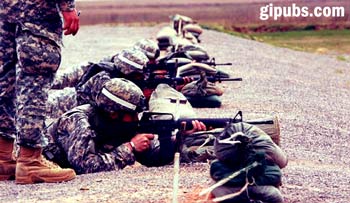
Observing your Soldiers at the shooting range is an example of performing an inspection that checks a specific skill or disipline.
The first thing you should identify is the goal of the inspection. There are two broad categories of inspections, verifying training and checking a standard. To verify training, you are asking a Soldier to carry out a task in the manner they have been trained. When checking a standard, you are testing discipline. Has the Soldier maintained the standards established by the unit and the Army?
Inspections can be designed to uncover details about any number of areas. Are you checking a Soldier’s knowledge or proficiency? Equipment readiness? Health and welfare? The important part is to determine your intent. What are you looking for? Ensure you have clear goals for the inspection.
What Technique Will You Use?
Once you have established the goal and purpose, you need to determine what techniques you will use: formal, informal, announced, unannounced, random sampling, or in-depth sampling. Read Part 1 in this series for detailed explanations of these terms. If you want to conduct a formal/announced inspection keep in mind these techniques require additional planning, preparation, and resources than informal/unannounced inspections. The technique you use should be determined by several factors:
- How much time do you have?
- Do your Soldiers have adequate time to prepare?
- Will they have to work late to prepare for your inspection?
If your team will be working late, will it be required as a result of their failure to perform to standard or because the method and time frame you have chosen do not allow them to adequately prepare? If it is the latter, I would encourage you to reevaluate your technique as your Soldiers will likely view this type of inspection as punishment.
WAR STORY
One of the best ways to prepare for in inspection is performing pre-inpections and spot checks ahead of time.
Army commands conduct a Command Inspection Program or CIP every year. Every unit knows the inspection is coming but most fail to properly prepare for it. As a First Sergeant I began preparing my unit 90 days prior to the inspection. I sat down with my key leaders and assigned each one specific areas of responsibility. We reviewed the previous inspection results and made an assessment of our current situation. We then developed a plan to ensure we were prepared for the CIP.
About two weeks prior to the inspection other units were working frantically to prepare. My company commander came over to me and said “Top, I am a little concerned. The other units are working late and on the weekends–and we are going home on time and in some cases early. The Battalion Commander has made several comments about the other units working late to prepare for the inspection. I don’t want him to think we are not taking this seriously.”
I turned to him and said, “Sir we will do fine. Our Soldiers are motivated. They are preparing in a methodical way; everything is being checked and rechecked. We have built in pre-inspections and spot checks, all of which have gone well. Our Soldiers see the other units working like crazy and they are thankful we have a plan. The Battalion Commander is a bright guy. When we pass this inspection he will know you are a Commander who cares about standards and his Soldiers.” The inspection came and went. The Battalion Commander could not say enough about the high standards and morale within our unit. The plan made the difference. Our Soldiers understood the plan and the consequences for improper execution and they achieved success. The other units in most cases did alright, but they were beat down and did not have a great attitude about the inspection or they way they had prepared. Where did I learn this technique from? My Father. He was a First Sergeant and he told me how he prepared for inspections when I was a young private. I never forgot it and used it every chance I could. It never failed to produce outstanding results. Thanks, Dad!
What Are the Standards?
Alright we have the goal, purpose and technique, now we need to establish the standards. What will we check and how will we check it? Ensure your standards are reasonable and obtainable.

If you set an inspection standard that’s beyond realistic expections, you run the risk of never establishing a clear standard.
WAR STORY
During a senior leadership training class one of our Instructors would come in everyday and conduct a room inspection with unobtainable standards. Of particular interest was his unreasonable toilet standard. He would take a finger and move it under the inside edge of the toilet bowl he would then put his index finger in his mouth and say, “Salty. You failed to properly clean your toilet. 25 demerits.” The guys in the room were blown away. One day he came in with his standard routine. When he got to the toilet bowl and announced “Salty” and allocated 25 demerits, I asked him if he would care to stick the correct finger in his mouth because he did not wipe the toilet with his index finger. Boy did I get a look! That ended the toilet bowl experience but more importantly it ended his credibility with us as he had put in place a bogus standard and then punished us with demerits based on his lack of integrity.
We realized no matter how hard we prepared he would just find something else wrong even if it was wrong in his eyes only. So we each prepared for our inspections as best we could and waited for the butt chewing. He felt great when he left the room because he really chewed us out, we felt great because the unreasonable waste of time inspection was over and our room was actually up to standard. If you want to piss off Soldiers, establish bogus standards that make you feel good but do nothing to increase proficiency, improve readiness, or recognize exceptional performance.
How Will You Notify Your Soldiers?
Once we have the standards in place it is time to work out the notification technique. What type of notification will you give? How far in advance will you notify your Soldiers? Is there any coordination required with supply or other sections to ensure the Soldiers have the resources they require to prepare for the inspection? Can you imagine what would happen if you conducted an in-ranks inspection on dress uniforms and only gave the Soldiers half a day to prepare? You set your Soldiers up for failure. Some will undoubtedly need to take their uniform to the cleaners and any Soldier who was recently promoted may have not had time to sew on their rank. Wow talk about pain! Your Soldiers will be pissed and you will not be impressed when you see the results because you are expecting Soldiers to meet unattainable standards. This will cause a cascading effect of bitterness and poor attitudes because you failed to provide proper notification.
After Action Review
The inspection is over. Now what? It’s time to tell the troops how they performed. It is important that the results of the inspection be announced in a professional manner. Do not single out substandard performers in public. Pull them to the side and take the appropriate action as an individual. If you have exceptional performers, recognize them appropriately in public. Determine what went right, what went wrong, and what the team can do to achieve better results next time. If necessary, formally record your results as a unit record or in individual records as appropriate. Develop a plan to work on the deficiencies and maintain the strong areas.



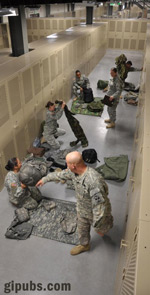

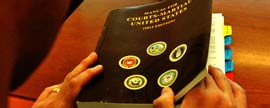
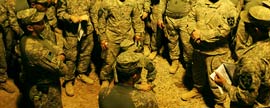
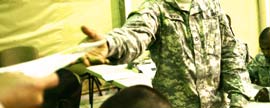







Comments
Part-Time-Commander
This is a great post, Mark. Inspections are a big deal. Unfortunately, many leaders “wing it” and don’t put much thought into it. I truly believe that for every hour you spend planning and preparing, you save several hours on the other end. You owe it to your Soldiers to be prepared. Follow the advice that Mark talks about and you will be well on your way.